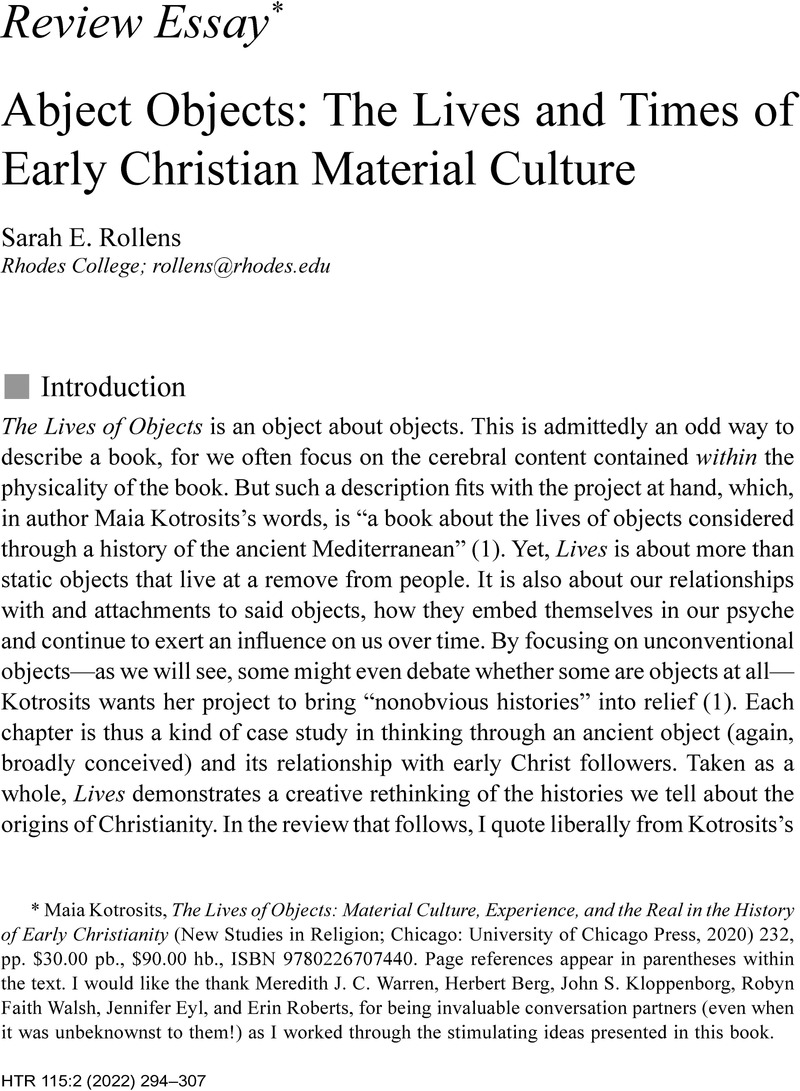No CrossRef data available.
Article contents
Abject Objects: The Lives and Times of Early Christian Material Culture
Published online by Cambridge University Press: 23 May 2022
Abstract

- Type
- Review Essay
- Information
- Copyright
- © The Author(s), 2022. Published by Cambridge University Press on behalf of the President and Fellows of Harvard College
Footnotes
Maia Kotrosits, The Lives of Objects: Material Culture, Experience, and the Real in the History of Early Christianity (New Studies in Religion; Chicago: University of Chicago Press, 2020) 232, pp. $30.00 pb., $90.00 hb., ISBN 9780226707440. Page references appear in parentheses within the text. I would like the thank Meredith J. C. Warren, Herbert Berg, John S. Kloppenborg, Robyn Faith Walsh, Jennifer Eyl, and Erin Roberts, for being invaluable conversation partners (even when it was unbeknownst to them!) as I worked through the stimulating ideas presented in this book.
References
1 This quotation is widely attributed to Albert Einstein (as in Science Daily, 14 Sept 2008, https://www.sciencedaily.com/releases/2008/09/080911154216.htm), though tracking down the original source proved impossible.
2 These words were spoken by the character Morpheus in the 1997 film The Matrix.
3 Jane Jacobs, Vital Little Plans: The Short Works of Jane Jacobs (New York: Random House, 2016)243.
4 Wisdom of Solomon 2:4 (NRSV). This sentiment, of course, is spoken by the “ungodly” in Wisdom of Solomon and is thus supposed to be rejected, but I have always found it very beautiful and compelling.
5 Denis Diderot, as quoted in Rev. James Woods, Dictionary of Quotations from Ancient and Modern, English and Foreign Sources (London: Good Press, 2019 [1893]) 216.
6 Like identity formation with respect to martyr stories, resistance in such accounts has been extremely overdetermined in modern scholarship as well (Michael F. Brown, “On Resisting Resistance,” American Anthropologist 98.4 [1996] 729-35).
7 Peter Garnsey, Social Status and Legal Privilege in the Roman Empire (Oxford: Clarendon Press, 1970).
8 Genesis 1:3.
9 David J. Linden, Touch: The Science of the Hand, Heart, and Mind (New York: Penguin, 2016) 4.
10 Patti Harrison, as quoted in Mark Olsen, “In a Breakout Role, Stand-up Comedian Patti Harrison Subverts Rom-com Rules in ‘Together Together,’” Los Angeles Times, 2 Feb 2021, https://www.latimes.com/entertainment-arts/movies/story/2021-02-02/patti-harrison-together-together-sundance.
11 Sarah E. Bond, “Why We Need to Start Seeing the Classical World in Color,” Hyperallergic, 7 June 2017, https://hyperallergic.com/383776/why-we-need-to-start-seeing-the-classical-world-in-color/.
12 The language of “darkening” is used in the title of this last chapter of The Lives of Objects: “Darkening the Discipline: Fantasies of Efficacy and the Art of Redescription.” It is a not a word that Bond herself employs.
13 Melanie S. Morrison, “Becoming Trustworthy White Allies,” Reflections (Spring, 2013), https://reflections.yale.edu/article/future-race/becoming-trustworthy-white-allies; Say Burgin, “Black Lives Matter, Black Power, and the Role of White Allies,” Black Perspectives, 12 Dec 2018, https://www.aaihs.org/black-lives-matter-black-power-and-the-role-of-white-allies/.
14 Sara Parks, “Historical-Critical Ministry? The Biblical Studies Classroom as Restorative Secular Space,” New Blackfriars 100 (2019): 229-44; R. R. Warne, “(En)Gendering Religious Studies,” Studies in Religion/Sciences Religieuses 27.4 (1998): 427-36; Francis Borchardt, “CSTT and Gender #2: A Gender Theory Critique of the Historical-Critical Method,” CSTT (blog), 6 July 2017, https://blogs.helsinki.fi/sacredtexts/2017/07/06/cstt-and-gender-a-gender-theory-critique-of-the-historical-critical-method/.





